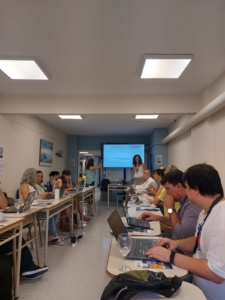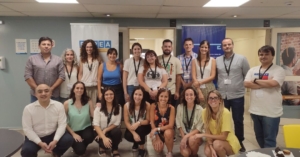On March 3 and 4, we participated in the workshop on Final Beneficiaries of Companies in the extractive and energy sector of Argentina, held in the City of Buenos Aires. The event was organized by Opening Extractives (a program co-implemented by EITI and Open Ownership) and the Argentine Journalism Forum (FOPEA).
“Below, we offer a google translate version of the original article in Spanish. This translation may not be accurate but serves as a general presentation of the article. For more accurate information, please switch to the Spanish version of the website. In addition, feel free to directly contact in English the person mentioned at the bottom of this article with regards to this topic”.
The workshop had among its objectives to raise awareness about the importance of public information of the final beneficiaries, and at the same time, provide resources and materials to increase research, projects and analysis within this field.
In this sense, the training was divided into three modules: first, content and information on final beneficiaries was presented, from the theoretical to the legal and also practical, both nationally and internationally. Those who spoke in this first module were: Andrés Knobel from the Tax Justice Network; María Eugenia Marano, specialist in corporate law; Pamela Morales, Undersecretary of Mining Development of the Government of the Nation; Gonzalo Fernández of the Ministry of Mining Development of the Nation; and Lucía Cirimello from the Extractive Industries Transparency Initiative (EITI).
Secondly, civil society organizations had the opportunity to present their projects related to the theme. In this way, Edgardo Livitnoff (Red Ruido Coordinator) presented progress on the report “Lithium and transparency in Argentina” that we prepared together. For her part, Eugenia Rodríguez (Centro de Economía Política Argentina) shared details about the work of her organization: “The rich of Argentina”.
Finally, the third module consisted of a practical workshop given by Mariel Fitz Patricks, in which tools and resources were provided for approaching final beneficiaries. The journalist helped us, mainly, to access information and how, in this way, to enrich work carried out and to carry out on the subject.
This instance was very fruitful, not only in terms of knowledge and learning, but also in terms of the possibility of meeting peers from other civil society organizations, with whom one could work together in the near future.
More information:
Author
Maitén de los Milagros Fuma
Contact
Maria Victoria Sibilla, ninasibilla@fundeps.org


